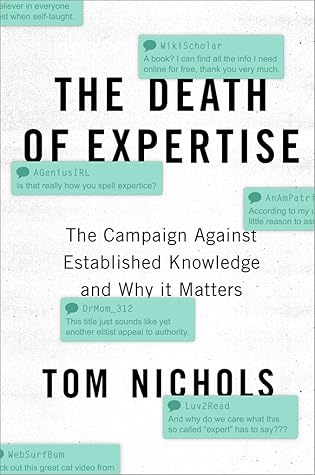More on this book
Community
Kindle Notes & Highlights
Read between
December 6 - December 10, 2018
The social psychologist Jonathan Haidt summed it up neatly when he observed that when facts conflict with our values, “almost everyone finds a way to stick with their values and reject the evidence.”15
Tiny local schools that once catered to area residents have reemerged as “universities,” as though they now have a particle collider behind the cafeteria.
Some are worse than others: there are even parents now moving to the same town as their children’s colleges to be near them while they attend school. This is not “helicopter parenting” but more like “close air-support jet fighter parenting.”
The major problem with instantaneous communication is that it’s instantaneous. While the Internet enables more people to talk to each other than ever before—a distinctly new historical condition—everyone talking immediately to everyone else might not always be such a good idea. Sometimes, human beings need to pause and to reflect, to give themselves time to absorb information and to digest it.
Rapid access to information and the ability to speak without having to listen, combined with the “keyboard courage” that allows people to say things to each other electronically they would never say in person, kill conversation.
1999. The New York Times duly reported on this study with a headline that read “As Suicides Rise in U.S., Veterans Are Less of Total.” The Washington Post headline implied an opposite conclusion: “VA Study Finds More Veterans Committing Suicide.” Both of these headlines, amazingly, were about the same study, and both, in a strictly factual sense, were true.
Hedgehogs, for example, tended to be overly focused on generalizing their specific knowledge to situations that were outside of their competence, while foxes were better able to integrate more information and to change their minds when presented with new or better data. “The foxes’ self-critical, point-counterpoint style of thinking,” Tetlock found, “prevented them from building up the sorts of excessive enthusiasm for their predictions that hedgehogs, especially well-informed ones, displayed for theirs.”27
The skepticism that I advocate amounts only to this: (1) that when the experts are agreed, the opposite opinion cannot be held to be certain; (2) that when they are not agreed, no opinion can be regarded as certain by a non-expert; and (3) that when they all hold that no sufficient grounds for a positive opinion exist, the ordinary man would do well to suspend his judgment.
Unelected bureaucrats and policy specialists in many spheres exert tremendous influence on the daily lives of Americans. Today, however, this situation is by default rather than by design. Populism actually reinforces this elitism, because the celebration of ignorance cannot launch communications satellites, negotiate the rights of US citizens overseas, or provide for effective medications, all of which are daunting tasks even the dimmest citizens now demand and take for granted.


